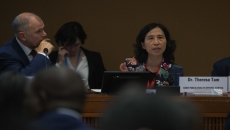A loss in court for Huawei CFO Meng Wanzhou has prompted another round of legal arguments in her attempt to avoid extradition to the United States on fraud charges.
Associate Chief Justice Heather Holmes of the B.C. Supreme Court ruled Wednesday the charges Meng faces in America could also be a crime in Canada and the case should proceed, a decision that one legal expert says puts the rule of law above political pressures.
"If you turn a blind eye in the favour of political outcomes, you're sacrificing the rule of law and then you do become subject to China's allegation or criticism that this is all political," said Robert Adamson, who teaches business law at the Beedie School of Business at Simon Fraser University.
Meng's arrest by the RCMP at the Vancouver airport in December 2018 placed Canada in the middle of rising tensions between the U.S. and China, and two Canadians, ex-diplomat Michael Kovrig and entrepreneur Michael Spavor, were detained in China nine days later. They remain in custody.
Meng is accused of misrepresenting Huawei's relationship with Skycom Tech Co. and making false statements to HSBC, putting the bank at risk of violating U.S. sanctions against Iran.
Her lawyers argued that Meng's conduct could not constitute fraud in Canada because it related to American sanctions that Canada doesn't apply, while the Attorney General of Canada told the court the fraud allegations could be argued without reference to the U.S. sanctions.
Justice Holmes found the U.S. sanctions are relevant to the issue of double criminality, but it wasn't enough to dismiss the case.
"The essence of the alleged wrongful conduct in this case is the making of intentionally false statements in the banker-client relationship that put HSBC at risk. The U.S. sanctions are part of the state of affairs necessary to explain how HSBC was at risk, but they are not themselves an intrinsic part of the conduct," she wrote in her decision.
"For this reason, I cannot agree with Ms. Meng that to refer to U.S. sanctions in order to understand the risk to HSBC is to allow the essence of the conduct to be defined by foreign law. Canada's laws determine whether the alleged conduct, in its essence, amounts to fraud."
A broad definition of double criminality helps avoid unforeseen consequences, said Adamson, a member of the Canadian Bar Association.
He said a narrower definition of double criminality could stop extradition hearings at preliminary junctures and limit Canada's ability to extradite as well as ask for someone to be extradited here.
Vancouver extradition lawyer Gary Botting took a different view, saying Justice Holmes's ruling creates a "hybrid" way of looking at double criminality by importing some, but not all of the context of the U.S. sanctions.
The Supreme Court of Canada has made plain that they prefer to say, "fraud is fraud, theft is theft," said Botting, adding that's "more or less what Holmes has followed."
However, by importing some, but not all of the context of the sanctions, Botting said Justice Holmes "made a mistake of the law."
"It can't be both ways. In other words, this is an appealable judgment, in my view."
In the next phase of the proceedings, the court will hear arguments about whether Meng's arrest was unlawful.
Her lawyers have alleged the Canada Border Services Agency, the RCMP and the Federal Bureau of Investigation conducted a "covert criminal investigation" at the airport and violated Meng's charter rights.
Border officers seized Meng's cellphones, tablet and other devices and wrote down her passcodes, which were then handed to the RCMP.
The Crown has told the court that when the border agency learned of its mistake it told the RCMP that the codes couldn't be used or shared because they were obtained during the agency's examination.
It said officials followed the law and there's no proof that Meng was illegally arrested.
Botting said he believes Meng's rights were violated.
"Whether that amounts to a stay of proceedings or not is entirely, again, up to the judge."
Adamson disagreed, saying he hasn't seen "any strong evidence" of her rights being violated, and from what he understands, that argument from her defence team isn't as strong as the double-criminality argument was.
"That is, if Ms. Meng and her defence team had a better chance of this case coming to a conclusion it was more likely to be on the double-criminality issue and not on this abuse of process," he said.
Canada's Justice Minister David Lametti will still have the final say on whether Meng should be extradited to the U.S.





